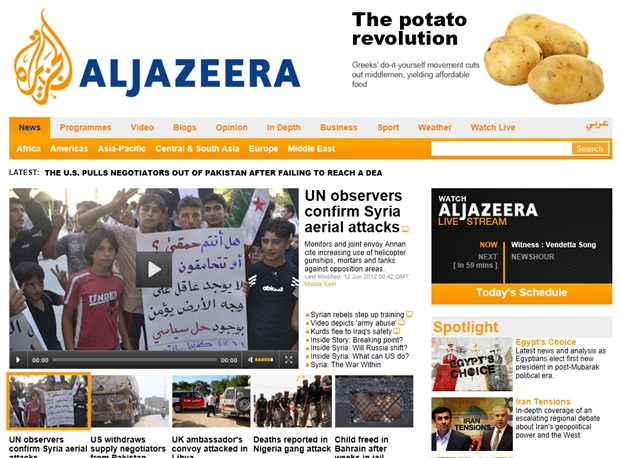
Major news in Qatar on June 12: UN observers confirm Syria aerial attacks
Top news in <Al Jazeera>: UN observers confirm Syria aerial attacks
Monitors and joint envoy Annan cite increasing use of helicopter gunships, mortars and tanks against opposition areas.
United Nations monitors have said Syrian helicopters fired on rebel strongholds north of Homs and that many women and children are trapped in the city.
The observers called on Monday for “immediate and unfettered access” to the conflict zones, while in Haffeh, a mainly Sunni town near the Mediterranean coast, the US State Department said it feared a “potential massacre”.
It was the first time the UN has verified repeated allegations by activists that Assad’s forces have fired from helicopters in the military crackdown on rebels.
“UN observers reported heavy fighting in Rastan and Talbiseh, north of [Homs], with artillery and mortar shelling, as well as firing from helicopters, machine guns and smaller arms,” UN spokeswoman Sausan Ghosheh said in a statement.
International envoy Kofi Annan said he is “gravely concerned” about the latest violence in Syria. In a statement on Monday, Annan said there was an escalation of fighting by government and opposition forces.
Violence has spiked in recent weeks, with both sides ignoring a UN-brokered cease-fire that was supposed to go into effect on April 12, but never took hold.
The outside world, divided in its approach toward President Bashar al-Assad’s crackdown on a 15-month-old uprising, has been unable to halt the violence despite broad international support for Annan’s tattered peace plan.
Monday’s aerial assault targeted the strategic river crossing town of Rastan, which has resisted repeated government offensives for months, activists said.
“The regime is now using helicopters more after its ground troops suffered major losses,” said Rami Abdul-Rahman, of the Britain-based activist group Syrian Observatory for Human Rights, citing sources inside Syria.
“Dozens of [military] vehicles have been destroyed or damaged” since the end of May, he said.
“Homs today bore much of the shelling, as the government is trying to crush any kind of dissent there,” said Al Jazeera’s Rula Amin, reporting from neighouring Lebanon.
“It took the government months to take control of those neighbourhoods,” Amin said. “And the rebels were able to take some of the neighbourhoods back. Residents are trapped between armed rebels and government forces.”
Our correspondent added: “[Annan’s] plan is not being implemented but the international community is not abandoning the plan because there is no alternative for now.”
Weaponised conflict
Jihad Makdissi, Syrian foreign ministry spokesman, recently said that rebels are now using sophisticated anti-tank missiles.
Videos posted by activists over the past week have shown many destroyed tanks and armoured personnel carriers.
The Observatory and another activist coalition, the Local Coordination Committees, also reported government shelling in the central provinces of Hama and Homs, where Rastan is located, as well as the southern region of Deraa, the northern province of Aleppo, and suburbs of the capital Damascus and Deir Azzour in the east.
The LCC has said 33 people were killed around the country on Monday. It was impossible to confirm the toll independently.
The Observatory reported at least 24 deaths throughout Syria for the day, including four civilians and an army defector in shelling in the area of Ashara in Deir el-Zour. It said another eight unidentified bodies were discovered nearby.
It reported three dead in the Hama shelling, four in Rastan and four near the northern city of Idlib.
The Observatory also said a bomb targeted a security force in the northern city of Idlib, killing seven soldiers and a civilian. There was no immediate confirmation from state media.
Damascus strife
In Damascus, the state-run news agency SANA said authorities foiled an attempt to blow up a car rigged with 700kg of explosives in the Damascus suburb of Chebaa. Experts dismantled it Monday, SANA said.
Syrian activists say 13,000 people have been killed in violence since the uprising began in March 2011.
The bloodshed has led to broad condemnation of the regime from the international community, although Russia, Iran and China have stood by President Bashar al-Assad.
Russia and China have vetoed two Security Council resolutions that threatened sanctions against Syria, and Russia has refused to support any move that could lead to foreign intervention in Syria, Moscow’s last significant ally in the region.
Russian Foreign Minister Sergey Lavrov is scheduled to visit Syria’s ally Iran on Wednesday.
In Germany, the country’s defence minister has sharply rejected the idea of military intervention in Syria, referring to those who ask for it as “coffeehouse intellectuals”.
Thomas de Maiziere told Monday’s edition of German daily Taz: “The continued waffling by people who bear none of the responsibility creates expectations in regions like Syria, thereby causing terrible disappointment”.
William Hague, the British foreign secretary, had said on Sunday that he could not rule out military intervention in Syria, saying the situation there is beginning to resemble the violence that gripped Bosnia in the 1990s.


